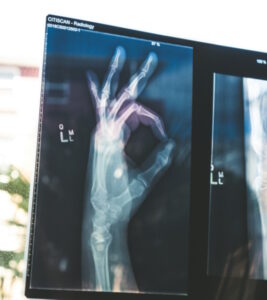Dive into the Healthcare Sector
Think about the healthcare sector and big pharmaceuticals usually come to mind. When we dive into the healthcare sector, we see it’s much more than that. From medication to vaccines to artificial hips to pacemakers, from sophisticated MRI machines to syringes and surgical gloves, from lab tests to managing hospitals, from getting supplies where they’re needed and delivering care, many industries play a role in healthcare.
Let’s explore what’s in the healthcare sector and whether it’s a good fit for dividend investors. Before we do, you can subscribe to our weekly newsletter, right here.
Healthcare sector industries
Here are the main industries in the healthcare sector, other than pharmaceuticals or drug manufacturers, and some of the goods and services they offer:
- Biotechnology: therapeutic proteins and antibodies; gene-editing therapeutic technology; industrial enzymes; etc.
- Diagnostics & research: equipment such as MRI or X-ray machines and blood analyzers; consumables used in labs; lab testing services; clinical trials for pharmaceutical companies.
- Medical devices: sophisticated equipment, e.g., MRI machines, CT scanners, surgical robots; implantable devices for orthopedic care, such as artificial knees and hips, cardiovascular care such as stents and heart valves, and neurological implants.
 Medical instruments & supplies: basic instruments, e.g., surgical, stethoscopes, blood pressure cuffs; consumables, e.g., gloves, syringes, test tubes; infection control products including disinfectant, sterilization equipment, personal protection equipment, etc.
Medical instruments & supplies: basic instruments, e.g., surgical, stethoscopes, blood pressure cuffs; consumables, e.g., gloves, syringes, test tubes; infection control products including disinfectant, sterilization equipment, personal protection equipment, etc.- Medical distribution: sourcing, warehousing, and distribution of medical products to hospitals, clinics, pharmacies, and other facilities. Intermediary between manufacturers and end-users, ensuring products reach their destinations efficiently and reliably.
- Healthcare plans: primarily individual and group health insurance.
- Medical care facilities: products and services related to healthcare delivery and patient care such as primary and specialty care services, technology and software, facilities management services, etc.
- Medical information services: products and solutions for healthcare providers, pharmaceutical companies, research institutions, and others in healthcare; aggregate, analyze, and disseminate medical information to support clinical decision-making, research, training and education, regulatory compliance, etc.
- Pharmaceutical retailers: your local drugstore.
Major influences in the healthcare sector
Drug manufacturers, biotechnology, and diagnostics & research companies allocate most of their budgets to research & development. They must manage their pipeline of new products and their patents. Companies can surf on previous successes for a decade due to patent protection, but they must constantly renew their portfolio. This frequently impacts their ability to increase their dividends predictably. Price volatility, both up and down, is also characteristic of companies in these industries.
Healthcare plans, care facilities, and distribution companies are subject to governmental regulations. The cost of healthcare is a major topic for governments across the world. Should it be free, sponsored, or insured? This question leads to much debate and uncertainty for the future. Whatever happens, these industries will find a way to adjust their business models, with volatility as their constant companion.
Greatest strengths for investors
 The advantage of this sector for dividend investors is the wide selection of large and well-established companies. Companies with strong distribution networks, large drug portfolios, or pipelines full of new products tend to be the top performers in the sector.
The advantage of this sector for dividend investors is the wide selection of large and well-established companies. Companies with strong distribution networks, large drug portfolios, or pipelines full of new products tend to be the top performers in the sector.
Big pharmaceuticals usually offer a haven for your money over the long run. They know how to manage their R&D budgets and drug pipelines. We often see their stock surge upward and plunge downward based on the results of their discoveries. Patents and regulations are part of their daily routine.
Medical devices and instruments & supply companies enjoy repetitive purchases for their products. They also benefit from wide distribution networks and loyal customers. They can make great dividend growers.
Healthcare plans are massive companies generating sticky cash flow, but they usually have tiny margins and must deal with potential shifts in healthcare regulations.
Pharmaceutical retailers are relatively stable. Since they’re usually recession-resistant, they could be seen as consumer staples stocks.
Greatest weaknesses
Many healthcare companies show an erratic dividend growth track record because of their huge R&D budgets. Not that they cut their dividend, but rather that it can take a few years to see a dividend increase.
Many drugs never reach the market, after millions (sometimes billions) spent developing them. Lawsuits and product recalls are also a hanging threat. For these reasons, it’s not advisable to have a big exposure to a single stock in the drug manufacturing industry.
Healthcare plans and medical distribution industries have razor-thin margins because they face harsh competition. One bad acquisition or one speed bump and their cash flow can evaporate quickly. There are many changes in the air around healthcare regulations. There’s a political will to make healthcare more affordable, which could affect these industries.
Medical care facilities have had their fair share of problems. After the pandemic, it’s become quite a challenge to manage increasing expenses to ensure the safety of both employees and seniors. They have weaker occupancy rates than in the past. Proceed with caution.
Getting the best of the sector
 Big pharmaceuticals often come with massive stock price fluctuations. A patent expiry, a new drug, or a major acquisition can all give Mr. Market mood swings. They can also give investors opportunities to pick up a solid dividend grower at a reduced price. I bought shares of Johnson & Johnson (JNJ) during their quality control issues in 2012-2013 and benefited greatly. Pfizer (PFE) has been going through a rough time since the sales of its Covid vaccine have dwindled; could be a good entry point for this massive pharma.
Big pharmaceuticals often come with massive stock price fluctuations. A patent expiry, a new drug, or a major acquisition can all give Mr. Market mood swings. They can also give investors opportunities to pick up a solid dividend grower at a reduced price. I bought shares of Johnson & Johnson (JNJ) during their quality control issues in 2012-2013 and benefited greatly. Pfizer (PFE) has been going through a rough time since the sales of its Covid vaccine have dwindled; could be a good entry point for this massive pharma.
In general, the healthcare sector is capital-intensive. It’s much easier for very large companies to perform well. Look for companies whose debt burden isn’t too great to manage efficiently. For distribution and healthcare plans, take a close look at their margins over time.
During bull markets, the healthcare sector is usually ignored by the market and investors. Why? because there are more exciting companies to buy in other sectors, consumer discretionary or industrials for example. This can turn into good buying opportunities. Above all else, you must be patient with healthcare businesses. It might take time before the market realizes the value inherent to a company’s stock.
Should you invest in this sector? How much?
The healthcare sector is best suited for income investors. Due to the lack of candidates with a decent yield, I’d say 3% to 10% allocation in a portfolio seems reasonable for both income and growth investors.
Some of my favorites in this sector are Johnson & Johnson (JNJ), AbbVie (ABBV), Lemaitre Vascular (LMAT), Abbott Laboratories (ABT).
If you liked this post, subscribe to our weekly newsletter!
The post Dive into the Healthcare Sector appeared first on Dividend Monk.
Source: https://www.dividendmonk.com/dive-into-the-healthcare-sector/
Anyone can join.
Anyone can contribute.
Anyone can become informed about their world.
"United We Stand" Click Here To Create Your Personal Citizen Journalist Account Today, Be Sure To Invite Your Friends.
Please Help Support BeforeitsNews by trying our Natural Health Products below!
Order by Phone at 888-809-8385 or online at https://mitocopper.com M - F 9am to 5pm EST
Order by Phone at 866-388-7003 or online at https://www.herbanomic.com M - F 9am to 5pm EST
Order by Phone at 866-388-7003 or online at https://www.herbanomics.com M - F 9am to 5pm EST
Humic & Fulvic Trace Minerals Complex - Nature's most important supplement! Vivid Dreams again!
HNEX HydroNano EXtracellular Water - Improve immune system health and reduce inflammation.
Ultimate Clinical Potency Curcumin - Natural pain relief, reduce inflammation and so much more.
MitoCopper - Bioavailable Copper destroys pathogens and gives you more energy. (See Blood Video)
Oxy Powder - Natural Colon Cleanser! Cleans out toxic buildup with oxygen!
Nascent Iodine - Promotes detoxification, mental focus and thyroid health.
Smart Meter Cover - Reduces Smart Meter radiation by 96%! (See Video).





